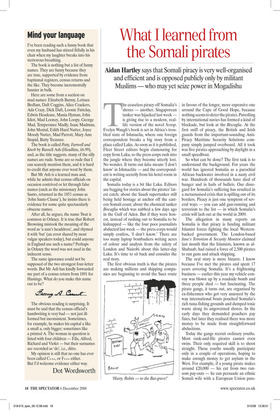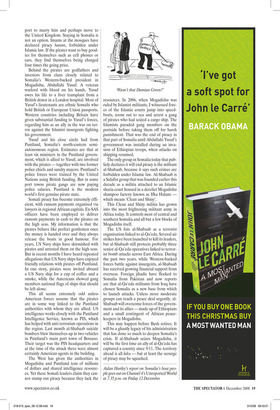What I learned from the Somali pirates
Aidan Hartley says that Somali piracy is very well-organised and efficient and is opposed publicly only by militant Muslims — who may yet seize power in Mogadishu The ceaseless piracy off Somalia’s shores — another, Singaporean tanker was hijacked last week — is giving rise to a modern, reallife version of the novel Scoop. Evelyn Waugh’s book is set in Africa’s troubled state of Ishmaelia, where one foreign correspondent breaks a big story from a place called Laku. As soon as it is published, Fleet Street editors begin clamouring for copy from Laku, so the press corps rush into the jungle where they become utterly lost. No wonder. It turns out laku means ‘I don’t know’ in Ishmaelite — and the correspondent is writing secretly from his hotel room in the capital.
Somalia today is a bit like Laku. Editors are begging for stories about the pirates’ latest catch; about the Saudi supertanker still being held hostage at anchor off the eastern Somali coast; about the chemical tanker Biscaglia which was nabbed a few days ago in the Gulf of Aden. But if they were honest, instead of rushing out to Somalia to be kidnapped — like the four poor journalists abducted last week — the press corps would simply confess, ‘I don’t know.’ There are too many laptop bombadiers writing acres of colour and analysis from the safety of London and Nairobi about this latter-day Laku. It’s time to sit back and consider the real story.
The first obvious truth is that the pirates are making millions and shipping companies are beginning to avoid the Suez route in favour of the longer, more expensive one around the Cape of Good Hope, because nothing seems to deter the pirates. Patrolling by international navies has formed a kind of blockade, but look at the Biscaglia. At the first sniff of piracy, the British and Irish guards from the important-sounding AntiPiracy Maritime Security Solutions company simply jumped overboard. All it took was five pirates approaching by daylight in a small speedboat.
So what can be done? The first task is to understand the background. For years the world has ignored Somalia as a parochial African backwater involved in a nasty civil war. Hundreds of thousands have died of hunger and in hails of bullets. Our disregard for Somalia’s suffering has resulted in a metastasised crisis that is spilling out of its borders. Piracy is just one symptom of several ways — you can add gun-running and terrorism to the list — in which Somalia’s crisis will lash out at the world in 2009.
The allegation in many reports on Somalia is that piracy is funding militant Islamist forces fighting the local Westernbacked government. The London-based Jane’s Terrorism & Security Monitor claimed last month that the Islamists, known as alShabaab, had raised a force of 2,500 pirates to run guns and attack shipping.
The real story is more bizarre. I know because I’ve met the pirates and spent 17 years covering Somalia. It’s a frightening business — earlier this year my vehicle convoy was blown up by a roadside bomb and three people died — but fascinating. The pirate gangs, it turns out, are organised by ex-fishermen who got very annoyed by the way international boats poached Somalia’s rich tuna-fishing grounds and dumped toxic waste along its ungoverned shores. In the early days they demanded poachers pay fines, but later they realised there was more money to be made from straightforward abductions.
Today the gangs recruit ordinary youths. Most rank-and-file pirates cannot even swim. Their only required skill is to shoot straight. These youths usually participate only in a couple of operations, hoping to make enough money to get asylum in the West. For example, if a young pirate makes around £20,000 — his cut from two ransom pay-outs — he can persuade an ethnic Somali wife with a European Union pass port to marry him and perhaps move to the United Kingdom. Staying in Somalia is not an option. Imams at the mosques have declared piracy haram, forbidden under Islamic law. If the pirates want to buy goodies for themselves such as cell phones or cars, they find themselves being charged four times the going price.
Behind the pirates are godfathers and investors from clans closely related to Somalia’s Western-backed president in Mogadishu, Abdullahi Yusuf. A veteran warlord with blood on his hands, Yusuf owes his life to a liver transplant from a British donor in a London hospital. Most of Yusuf’s lieutenants are ethnic Somalis who hold British or European Union passports. Western countries including Britain have given substantial funding to Yusuf’s forces, regarding him as an ally in the war on terror against the Islamist insurgents fighting his government.
Yusuf and his close circle hail from Puntland, Somalia’s north-eastern semiautonomous region. Estimates are that at least six ministers in the Puntland government, which is allied to Yusuf, are involved with the pirates — together with two former police chiefs and sundry mayors. Puntland’s police forces were trained by the United Nations using British funding. But in some port towns pirate gangs are now paying police salaries. Puntland is the modern world’s first genuine pirate state.
Somali piracy has become extremely efficient, with ransom payments organised via lawyers in regional African capitals. Ex-SAS officers have been employed to deliver ransom payments in cash to the pirates on the high seas. My information is that the pirates behave like perfect gentlemen once the money is handed over and they always release the boats in good humour. For years, US Navy ships have skirmished with pirates and arrested them on the high seas. But in recent months I have heard repeated allegations that US Navy ships have enjoyed friendly relations with pirates off Puntland. In one story, pirates were invited aboard a US Navy ship for a cup of coffee and a smoke, while the Americans showed gang members national flags of ships that should be left alone.
This all seems extremely odd unless American forces assume that the pirates are in some way linked to the Puntland authorities with whom they are allied. US intelligence works closely with the Puntland Intelligence Service, known as PIS, which has helped with anti-terrorism operations in the region. Last month al-Shabaab suicide bombers blew themselves up in two vehicles in Puntland’s main port town of Bossaso. Their target was the PIS headquarters and at the time of the attack there were almost certainly American agents in the building.
The West has given the authorities in Mogadishu and Puntland tens of millions of dollars and shared intelligence resources. Yet these Somali leaders claim they cannot stamp out piracy because they lack the resources. In 2006, when Mogadishu was ruled by Islamist militants, I witnessed forces of the Islamic courts jump into speedboats, zoom out to sea and arrest a gang of pirates who had seized a cargo ship. The Islamists paraded gang members on the portside before taking them off for harsh punishment. That was the end of piracy in that part of Somalia until Abdullahi Yusuf’s government was installed during an invasion of Ethiopian troops, when attacks on shipping resumed.
The only group in Somalia today that publicly declares it will end piracy is the militant al-Shabaab, because it says such crimes are forbidden under Islamic law. Al-Shabaab is a Salafist group that was founded earlier this decade as a militia attached to an Islamic sharia court housed in a derelict Mogadishu shampoo factory known as Ifka Halane — which means ‘Clean and Shiny’.
This Clean and Shiny militia has grown into the most frightening militant army in Africa today. It controls most of central and southern Somalia and all but a few blocks of Mogadishu itself.
The US lists al-Shabaab as a terrorist organisation linked to al-Qa’eda. Several air strikes have been launched to kill its leaders, but al-Shabaab still protects probably three senior al-Qa’eda operatives linked to terrorist bomb attacks across East Africa. During the past two years, while Western-backed forces battle against insurgents, al-Shabaab has received growing financial support from overseas. Foreign jihadis have flocked to Somalia from Pakistan and now reports are that al-Qa’eda militants from Iraq have chosen Somalia as a new base from which to launch attacks. Unless more moderate groups can reach a peace deal urgently, alShabaab will overcome forces of the government and its allies — made up of Ethiopians and a small contingent of African peacekeepers in Mogadishu.
This may happen before Bush retires. It will be a ghastly legacy of his administration that has done so much to deepen Somalia’s crisis. If al-Shabaab seizes Mogadishu, it will be the first time an ally of al-Qa’eda has captured a country since 9/11. The territory ahead is all laku — but at least the scourge of piracy may be squashed.
Aidan Hartley’s report on Somalia’s boat people goes out on Channel 4’s Unreported World at 7.35 p.m. on Friday 12 December.



















































































 Previous page
Previous page